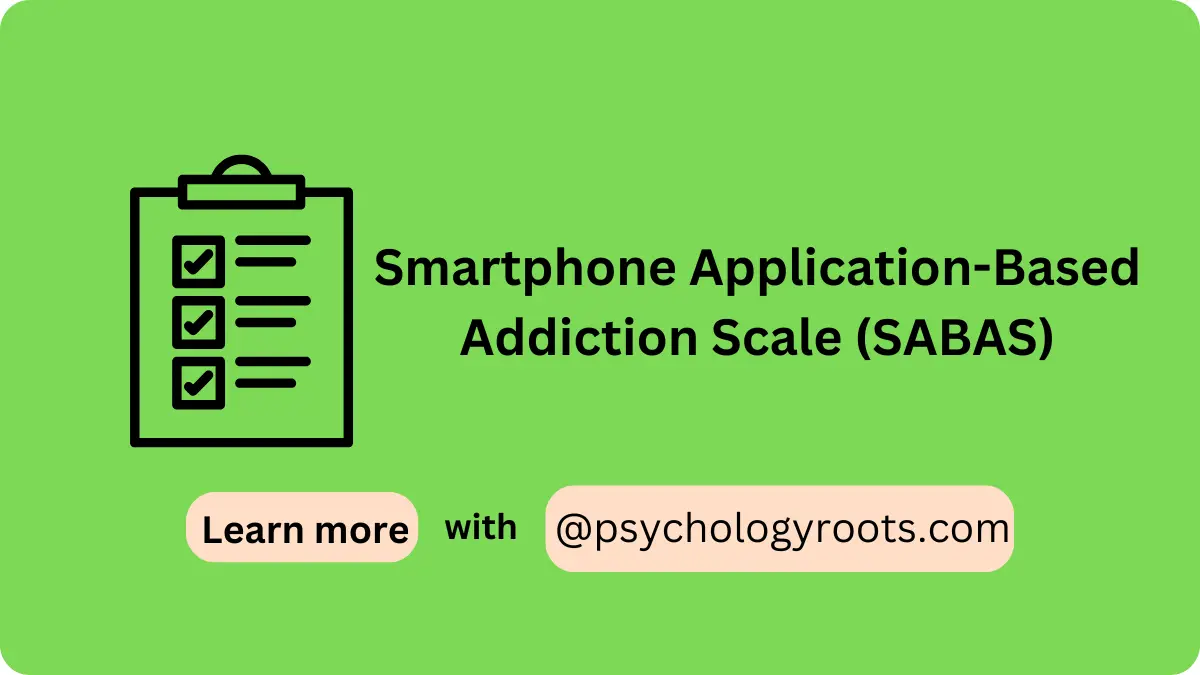Table of Contents
Smartphone Application-Based Addiction Scale (SABAS)
Here in this post, we are sharing the “Smartphone Application-Based Addiction Scale (SABAS)”. You can read psychometric and Author information. We have thousands of Scales and questionnaires in our collection (See Scales and Questionnaires). You can demand us any scale and questionnaires related to psychology through our community, and we will provide you with a short time. Keep visiting Psychology Roots.
About Smartphone Application-Based Addiction Scale (SABAS)
Scale Name
Smartphone Application-Based Addiction Scale (SABAS)
Author Details
Sándor Csibi and Fellows
Translation Availability
English

Background/Description
The Smartphone Application-Based Addiction Scale (SABAS) is a six-item self-report measure designed to assess problematic use of smartphone applications, particularly in relation to addiction-like behaviors. Developed by Csibi et al. in 2018, the scale focuses on cognitive and behavioral components of excessive smartphone use.
Respondents rate their agreement with statements such as “My smartphone is the most important thing in my life” on a six-point Likert scale, ranging from strongly disagree (1) to strongly agree (6). Total scores range from 6 to 36, with higher scores indicating a greater likelihood of smartphone application addiction.
The SABAS has shown robust psychometric properties across diverse populations, making it a reliable tool for assessing smartphone-related addiction behaviors in both clinical and research settings.
Administration, Scoring and Interpretation
- Obtain the Scale: Access the SABAS through the original publication or validated adaptations.
- Purpose: Evaluate problematic and addiction-like behaviors related to smartphone applications.
- Provide Instructions: Explain the purpose of the assessment and assure participants of confidentiality. Clearly define the six-point rating scale.
- Rate the Items: Respondents rate six items on a scale of 1 (strongly disagree) to 6 (strongly agree).
- Scoring: Sum the item scores for a total ranging from 6 to 36. Higher scores indicate a greater tendency toward smartphone application addiction.
Reliability and Validity
The SABAS has been found to have to good reliability (Csibi et al., 2018), which has also been found in the present study in the UK sample (α=.84). According to CFA results for the Indonesian adaptation (χ2 /df=2.86, RMSEA=.08 (CI 90% [.05, .12]), SRMR=.04, CFI=.99, TLI=.99) with high internal consistency (α=.81). According to the CFA results for the Polish adaptation (χ2 /df=1.61, RMSEA=.06 (CI 90% [.00, .11]), SRMR=.05, CFI=.99, TLI=.99) with high internal consistency (α=.81).
Available Versions
06-Items
Reference
Csibi, S., Griffiths, M. D., Cook, B., Demetrovics, Z., & Szabo, A. (2018). The Psychometric Properties of the Smartphone Application-Based Addiction Scale (SABAS). International journal of mental health and addiction, 16(2), 393–403. https://doi.org/10.1007/s11469-017-9787-2
Springer Link. (2023). SABAS Reference Entry. https://link.springer.com/referenceworkentry/10.1007/978-3-030-89738-3_45-1
Important Link
Scale File:
Frequently Asked Questions
What is the SABAS used for?
It assesses problematic smartphone application use and addiction-like behaviors.
Who can use the SABAS?
Clinicians and researchers studying the impact of smartphone use on mental health and behavior.
How many items does the SABAS have?
Six items.
What is the scoring range of the SABAS?
Total scores range from 6 to 36, with higher scores indicating greater addiction intensity.
Is the SABAS culturally adaptable?
Yes, it has been validated in the UK, Indonesia, and Poland, demonstrating reliable psychometric properties.
Disclaimer
Please note that Psychology Roots does not have the right to grant permission for the use of any psychological scales or assessments listed on its website. To use any scale or assessment, you must obtain permission directly from the author or translator of the tool. Psychology Roots provides information about various tools and their administration procedures, but it is your responsibility to obtain proper permissions before using any scale or assessment. If you need further information about an author’s contact details, please submit a query to the Psychology Roots team.
Help Us Improve This Article
Have you discovered an inaccuracy? We put out great effort to give accurate and scientifically trustworthy information to our readers. Please notify us if you discover any typographical or grammatical errors.
Make a comment. We acknowledge and appreciate your efforts.
Share With Us
If you have any scale or any material related to psychology kindly share it with us at psychologyroots@gmail.com. We help others on behalf of you.